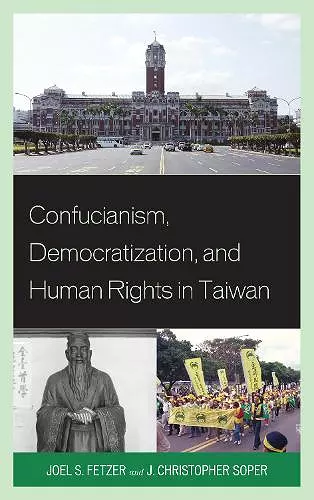Confucianism, Democratization, and Human Rights in Taiwan
J Christopher Soper author Joel Fetzer author
Format:Hardback
Publisher:Lexington Books
Published:12th Oct '12
Currently unavailable, and unfortunately no date known when it will be back
This hardback is available in another edition too:
- Paperback£42.00(9781498503259)

Responding to the “Asian values” debate over the compatibility of Confucianism and liberal democracy, Confucianism, Democratization, and Human Rights in Taiwan, by Joel S. Fetzer and J. Christopher Soper, offers a rigorous, systematic investigation of the contributions of Confucian thought to democratization and the protection of women, indigenous peoples, and press freedom in Taiwan. Relying upon a unique combination of empirical analysis of public opinion surveys, legislative debates, public school textbooks, and interviews with leading Taiwanese political actors, this essential study documents the changing role of Confucianism in Taiwan’s recent political history. While the ideology largely bolstered authoritarian rule in the past and played little role in Taiwan’s democratization, the belief system is now in the process of transforming itself in a pro-democratic direction. In contrast to those who argue that Confucianism is inherently authoritarian, the authors contend that Confucianism is capable of multiple interpretations, including ones that legitimate democratic forms of government. At both the mass and the elite levels, Confucianism remains a powerful ideology in Taiwan despite or even because of the island’s democratization. Borrowing from Max Weber’s sociology of religion, the writers provide a distinctive theoretical argument for how an ideology like Confucianism can simultaneously accommodate itself to modernity and remain faithful to its core teachings as it decouples itself from the state. In doing so, Fetzer and Soper argue, Confucianism is behaving much like Catholicism, which moved from a position of ambivalence or even opposition to democracy to one of full support. The results of this study have profound implications for other Asian countries such as China and Singapore, which are also Confucian but have not yet made a full transition to democracy.
Adding to the debate about the compatibility of Confucianism and democracy, this book focuses upon the role of Confucian values in the democratization of Taiwan. In contrast to the argument that Confucianism is largely conservative and has been used to legitimize political authoritarianism, the authors contend that this relationship is not inherent and is actually evolving, as illustrated by the experiences of Taiwan. Specifically, interviews with Taiwanese political leaders, surveys on mass-level attitudes, themes of public school textbooks, and analyses of legislative debates suggest that this belief system is now transforming itself in a pro-democratic direction. Persuasive as it is, the assertion that Confucianism can be reformulated in a liberal, democratic way (if the ideology is decoupled from the state), at a minimum, implies that some core Confucian principles are fundamentally incompatible with liberal democratic values. Overall, Fetzer and Soper provide an excellent and distinctive theoretical argument for the role of transcendent traditions in democratic politics. It will be of interest to students and scholars of Confucianism, Asian philosophy, tradition and democratization, and Taiwan studies. Summing Up: Highly recommended. Upper-division undergraduate, graduate, and research collections. * CHOICE *
The role of Confucianism in Taiwan’s democratization is an important question. In Confucianism, Democratization, and Human Rights in Taiwan, Joel S. Fetzer and J. Christopher Soper examine this question through interviews with pro-democracy politicians, analysis of data from public opinion surveys between 1995 and 2009, Confucian content in textbooks before and after democratization, and legislative debates on key laws passed in the process of political liberalization. The study includes valuable points for the general reader interested in political and social developments in Taiwan. The back jacket summary tells the reader that Confucianism ‘played little role in Taiwan’s democratization.’ This overall conclusion, perhaps of greatest interest to the general reader, is supported by the different sources of data in the study. * Taiwan Today *
Confucianism, Democratization, and Human Rights in Taiwan remains an excellent primer on Confucian thought and its contemporary relevance, especially in Taiwan. Highly recommended for all. * Newsletter of Christians in Political Science *
Fetzer and Soper have produced an excellent case study that is both conceptually sophisticated and methodologically nuanced. This work combines a detailed understanding of the Taiwanese case with attention to major questions of the role of transcendent traditions in democratic politics. -- Ted G. Jelen, University of Nevada, Las Vegas
ISBN: 9780739173008
Dimensions: 236mm x 158mm x 15mm
Weight: 331g
126 pages